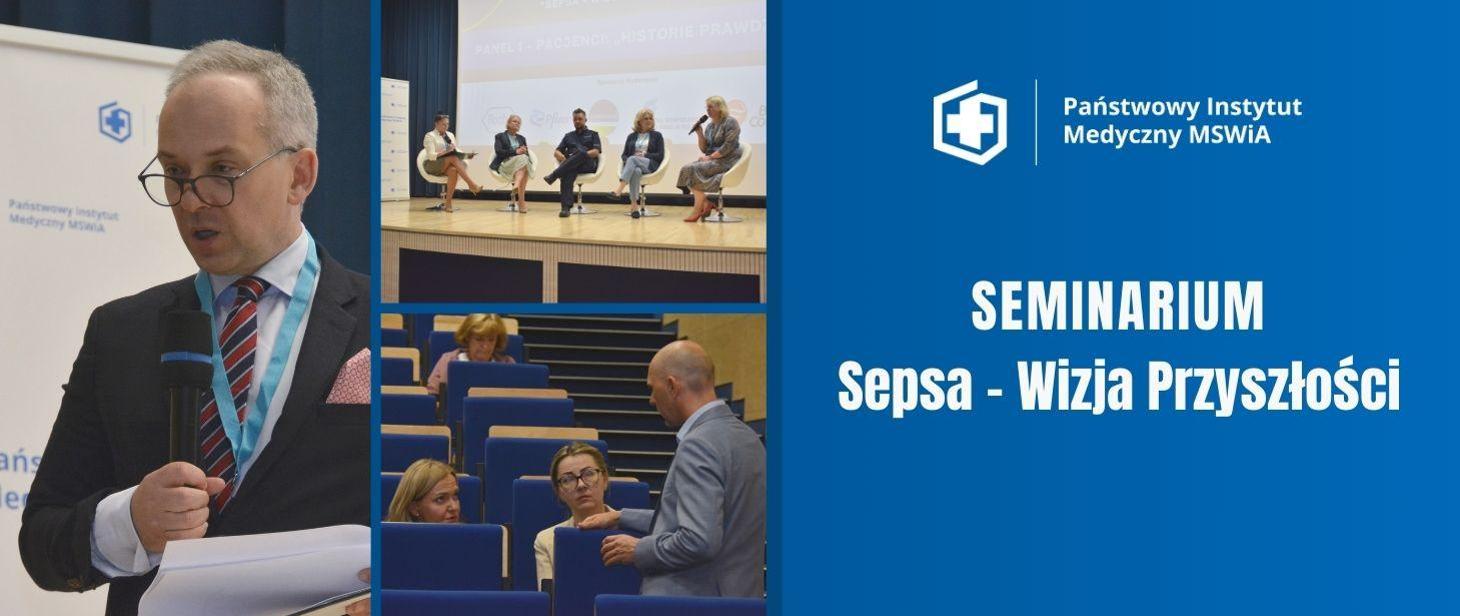The excitement has now subsided a little, so it is time to take stock of the seminar "𝗦𝗘𝗣𝗦𝗔 - VISION OF THE FUTURE", organised with the National Medical Institute of the Ministry of Internal Affairs and Administration
Many topics were covered throughout the meeting, but the conclusion was basically one - 𝗦𝗘𝗣𝗦𝗔 IS A SOCIAL AND MEDICAL PROBLEM, and prevention and education - both of patients and the wider healthcare community - are key elements for preventing infection wherever possible.
Dr Konstanty Szułdrzyński - opening the meeting - stressed that the participation of patients in the creation of the healthcare system and in making changes to it is very important, because the patient is the subject of action, and the patient's perspective makes the medical community aware of problems that they may not see or treat as less important. Thank you, Doctor - these are important words for us - the patients' representatives.
A short lecture on sepsis in numbers, incidence statistics, severe courses of infection and deaths made many realise how serious the problem is. The doctor also emphasised that in many risk groups, the incidence can be minimised by vaccination against pathogens (megingococcus, pneumococcus), which are the most common contributors to the development of the disease. The problem of late effects of sepsis was also noted - according to statistics, half of the people after intensive treatment become multi-morbid, and 𝟱𝟬% of such patients die within 𝟯 consecutive years.
In the opening panel discussion, participants were able to listen to real stories from patients themselves, who had contracted sepsis, recovered and shared with us the emotions that accompany them to this day. We would like to thank Mrs Wioletta Wilk - mother of today's 6-year-old Karolina, who was born extremely premature and had to face sepsis twice, Mrs Katarzyna Żeleźnicka - for the moving time devoted to us, Mr Slawomir Sobolewski, who went through sepsis three times while battling a severe 𝗖𝗼𝘃𝗶𝗱-𝟭𝟵 infection, and Kasia Lisowska - a mum whose son contracted sepsis while being treated for the effects of a traffic accident. All stressed the importance of public education about the severe infection that is sepsis.
A heated discussion accompanied the discussions in the panel "Multidisciplinary direction in the diagnosis and treatment of sepsis", which was fantastically moderated by Dr Rafał Staszewski and featured Prof Jacek Wysocki, Prof Marcin Czech, Prof Miłosz Parczewski, Dr Paweł Witt and Dr Jakub Klepaczyński.
The panellists were almost unanimous in pointing out that it pays to diagnose sepsis early, but equally stressed the need to extend access (also financially) to vaccination to every group at risk and the need to create a register of sepsis cases and deaths due to sepsis, as this will allow us to see how massive the scale of the problem is. The call for education of the medical community, particularly in 𝗣𝗢𝗭, 𝗦𝗢𝗥 𝗶 𝗭𝗥𝗠, also resounded during this conversation, as this is where the life of a patient who may develop sepsis can realistically be saved. Because sepsis often starts at home!
The third panel, entitled 'Septic logistics of diagnosis and treatment', moderated by Dr Konstanty Szułdrzyński, and to which Dr Justyna Marynowska, Prof Robert Galązkowski, Dr Malgorzata Mikaszewska -Sokolewicz, Prof Iwona Paradowska-Stankiewicz and Dr Michał Dzięgielewski were invited, once again emphasised the role of vaccination as sepsis prevention. All panellists stressed that we have tools, methods and drugs available to treat sepsis, but we are still fighting and many are still losing this battle. It was rightly noted that the medical and patient communities expect the Ministry of Health to "fix" the problem of sepsis with regulations governing its treatment, but, as noted, it all comes down to the person who has achieved titles, qualifications, but should continue to learn, improve their knowledge in order to be responsible for the health and life of their patient in the most perfect way possible.
To sum up the meeting, which, thanks to a wide range of experts from different fields, allowed many topics related to sepsis to be raised, and which have so far rarely been noted in discussions about this disease - we need to stop just talking, we need to start acting.
Without counting the scale of the problem, patients will continue to die from sepsis, generating a huge financial burden on the system due to the need for intensive care for patients who, with early diagnosis of the infection, could quickly recover and return to their daily lives.
Infection prevention, pro-vaccine education and education in the rapid response pathway when the disease is suspected of developing - these are the cornerstones for effective action in the fight against sepsis. In the effective diagnosis and therefore treatment of sepsis, time is as much an adversary in the fight for someone's health as the disease itself.
Because we have not won against this disease. And there is still a lot of hard, real work ahead of us to at least begin to win against it. But this meeting also allowed for some interesting behind-the-scenes conversations, thanks to which a plan for further joint activities is being born, and what has been done within these plans - we will tell you next year, during the next seminar, planned for World Sepsis Day in 𝟮𝟬𝟮𝟱!

